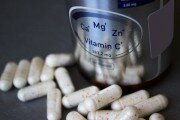Are you getting enough salt in your diet?
Everyone knows that you should avoid salt, right? Because salt can cause high blood pressure, correct?
The answers to those questions: no and no.
In fact, recent research from Germany indicates that older people who choose a sodium-free diet may be doing more harm than good. In fact, MUCH more harm than good.
The salt misconception
‘Of all the flavours one eats, salt is indispensable.’
That’s an old Chinese proverb that doesn’t get much play these days – mainly because of the mainstream mindset tells us that salt is bad. And it can be, when consumed in excess. But for the average person, a moderate daily intake of salt is not harmful. And according to research presented at the European Geriatrics Congress in Vienna, some of the people who need salt in their diets the most may be getting the least.
Professor Ingo Fusgen of the Department of Geriatrics at the University of Witten-Herdecke in Witten, Germany, presented research at the congress showing that as many as 10 percent of elderly people may suffer from hyponatraemia (low blood levels of sodium).
Furthermore, hyponatraemia often goes undiagnosed because symptoms are so similar to some of the conditions that we associate with ageing, such as fatigue, poor concentration, confusion, poor balance and incontinence. When hyponatraemia becomes pronounced, hallucinations and even coma may result.
In a presentation that has not yet been published, Prof. Fusgen reported that 80 percent of the elderly subjects in his research told him that they avoided salt based on the popular misconception that salt intake causes high blood pressure (HBP).
In a press release, Prof. Fusgen stated that many otherwise healthy older people may be in danger simply because of the widespread belief that a low-salt diet is healthy.
Salt’s best friend
I completely agree with Prof. Fusgen, but I’ll take it even one step further. Not only does sodium intake NOT cause high blood pressure, in most cases it’s not even a problem for people who already have HBP, provided they’re getting enough of another nutrient.
According to the late Dr Robert C. Atkins, the problem for those with HBP isn’t sodium, it’s a lack of balance between sodium and potassium levels. In fact, more than 25 separate studies show how increasing potassium intake (without decreasing the sodium) is an effective way to lower blood pressure. And one of those studies demonstrated that with just one daily serving of a potassium-rich food the risk of death by stroke may be cut by as much as HALF.
Fortunately, it’s easy to increase the potassium in your diet. High potassium fruits include apricots, bananas, cantaloupe, honeydew melon and citrus fruits. Vegetables with good amounts of potassium are asparagus, potatoes, green beans, avocados and cauliflower. Other foods high in potassium: grain products, red meat, poultry, seafood and dry beans, such as peas and lentils.
It would be difficult to get too much potassium from dietary sources alone. But if you’re already getting plenty of potassium in your diet, a potassium supplement would be unnecessary for most people, and in some extreme cases could lead to kidney damage and other complications. Obviously, balance is called for. And – as always – talk to your doctor, dietician or health care practitioner before using potassium supplements to help manage high blood pressure.
Obviously a long-term overindulgence in salt is dangerous, putting stress on the kidneys, which remove excess salt from the blood. So if you love your salt, you might try using sea salt. According to some physicians, moderate use of Celtic Sea Salt has been shown to have no negative effects on blood pressure and actually provides the body with a number of helpful minerals, including magnesium, which is essential for heart health.
Did you find this information useful?
Then why not get more expert health recommendations just like this delivered direct to your inbox?
"It is truly refreshing to read a newsletter on the topic of alternative medicine which is scientifically based and reviewed by professionals..." - Robert Sinott
We respect your privacy and will never share your details with anyone else.Bear in mind all the material in this email alert is provided for information purposes only. We are not addressing anyone?s personal situation. Please consult with your own physician before acting on any recommendations contained herein.
- Comments (8)
- Facebook Comments (0)
Comments are closed.











High quality Black Salt. Black salt is also known as kala namak. It is a special type of Indian mineral salt with a distinctive / sulfurous flavor. It is not interchangeable with sea salt or table salt because of it’s distinct flavor. It is rich in iron.
For more details visit our website. http://www.salt.soo.co.in/indian-black-salt-kala-namak.htm
Black salt, Indian Kala Namak, Himalayan Black Salt manufacturer, exporter, india
Different types of salts
Sundaram Overseas Operation, India
Epsom salt is a pure mineral compound composed of magnesium which has long been known as a natural remedy for many health conditions. Epsom salt can also relax the nervous system and soothe the body, mind, and soul.
Epsom salt is common minerals in geological environments. Iits occurrence is mostly connected with supergene processes. Some of them are also important constituents of evaporitic potassium-magnesium (K-Mg) salts deposits.
HeartCare (Low Sodium Salt) is a salt substitute. A low-sodium food additive that tastes like salt. It is used as a dietary alternative to salt.
Low Sodium Salt is high in natural potassium. It is specially developed to reduce sodium intake. Lower sodium in diets may help in management of high blood pressure, maintaining normal body weight & promoting physical activity.
I was experiencing very bad migraines and realised when we were moving house i had unlike usual eating lots of tomato and ham sandwiches and dosinfg a bit too much salt so started a really salt free dietand migraines stopped a bit ( I now realise it was the ham) So for about five years almost no salt and before i had never liked salty things. I have over the years had terrible back spasms . sometimes from just lifting a piece of paper. Last April i was hospitalised with such a severe back pain and shaking with pain like a sort of fit . I recovered but realised through the nexrt weeks that my whole bidy was weak and i couln t run( I am 56 and have been a professional equestrian rider so always very fit . I have always had very very low blood pressure and cholestrol)
No doctor had ever asked me about salt but i thought perhaps it is salt . Anyway to cut a long story short I now take at lease 8mg a day and am as fit as a fiddle no back problems no weakness and loving a bag of crisps
Why are there not tests for vitamin and mineral shortages done regularly . I am sure a lot of probs would be solved
Can anyone tell me whether lack of salt in diet may cause tingling fingers please.
It’s not the substance known as salt that’s thought to increase blood pressure, it’s a product of salt called sodium. There is so much sodium in everything that it’s practically impossible to live under the FDA’s Daily Value recommendation unless you live on a diet of oatmeal so I think that most if not all people who avoid salt to avoid sodium are still getting more than enough of it already.
Hi,
I have high potassium levels and have been told to avoid potassium foods – which, I have discovered is almost everything that is healthful. I can’t seem to find the cause. Do you have any suggestions?
Thanks.
very informative, thank you! My family has been on a low sodium diet for almost 2 years to control HBP, and i am just now finding out information like this. I shall be getting rid of the table salt, and using sea salt from now on. (and of course further my reading on risks and benefits of a low sodium diet)